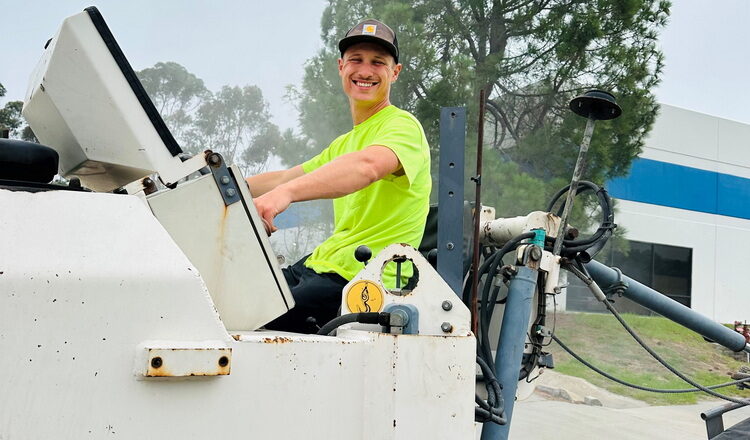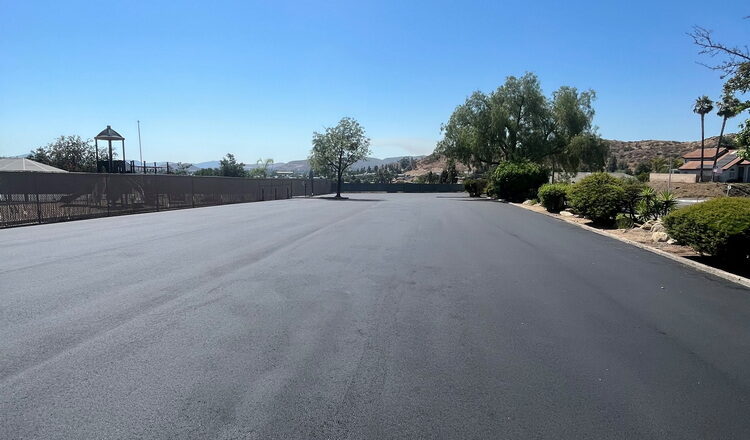Professionally Installed Wheel Stops in Southern California
Whatever you call them, we can provide and install wheel stops to meet your needs. You can even call them parking blocks, truck stops, or wheel stops.
The two primary options are rubber or concrete. Although there are a few other options, including railroad ties or plastic wheel stops, we don’t advise using them due to potential legal issues and their poor durability.
It makes sense that the workhorse of this category is concrete wheel stops. They are long-lasting, reasonably priced, robust, and difficult to steal. That’s excellent because once they do become loose, they usually don’t roam about much. Concrete wheel stops can be installed in a number of ways. One is by drilling steel rebar pins into the asphalt surface. Another approach is to use sturdy two-part epoxy for surfaces that are either too difficult or inappropriate to drill into, such as concrete parking facilities.
A few drawbacks of concrete wheel stops are their weight, which usually necessitates the assistance of multiple individuals for installation. Furthermore, concrete deteriorates with time and can pose a risk when it does.
Rubber wheel stops would be the next best option for wheel stops. Rubber wheel stops have their own advantages as well: they are lightweight and easy to install by one person; they are composed of recycled rubber, which is good for the environment; they don’t chip or break easily; and if they do come loose, they usually don’t pose the same kind of risk as concrete wheel stops (think vehicle damage or trips and falls). The fact that they come in a variety of hues is an additional advantage. The disadvantages are that they cannot be repainted and are more expensive than their concrete relatives.
To stop cars from parking on sidewalks, crossing into medians, or going into other forbidden locations, wheel stops and parking blocks are positioned within car stalls. Our low-profile wheel stops are made of 3500 psi concrete reinforced with #4 steel rebar for added strength. This reduces the likelihood of chipping and possible vehicle damage.
Model | Description | A — Length | C — Height | B — Width | Weight | Reinforcements |
|---|---|---|---|---|---|---|
TB04 | Truck Wheel Stop 4' | 4' Feet | 12 inches | 7.5 inches tall | 283 lbs. | Four #4 Rebar Tied, Two #8 x 22" pins |
TB06 | Truck Wheel Stop 6' | 6' Feet | 12 inches | 7.5 inches tall | 410 lbs. | Four #4 Rebar Tied, Two #8 x 22" pins |
TB06x12 | Truck Wheel Stop 6' | 6' Feet | 12 inches | 7.5 inches tall | 730 lbs. | Four #4 Rebar Tied, Two #8 x 22" pins |
TB08 | Truck Wheel Stop 8' | 8' Feet | 12 inches | 7.5 inches tall | 560 lbs. | Four #4 Rebar Tied, Two #8 x 22" pins |
Concrete Wheel Stop Options
4′ Concrete Wheel Stop Features:
The four-foot concrete wheel stop is the most commonly installed type of wheel stop worldwide for good reasons. It’s affordable, rugged, and readily available, making it the ideal choice for most parking lot situations.
- 3500 psi
- 115 lbs
- Dimensions: 4’(L) x 12”(W) x 7.5”(H)
- Strong, durable, and easy to install
- Installation options include rebar or epoxy
- Installed using a power drill and sledgehammer
A 4 or 6 foot concrete wheel stop is a wonderful option if typical vehicle traffic uses your parking lot the majority of the time. However, what makes a 6-foot wheel stop preferable to a 4-foot one? It all boils down to personal preference and possible cost savings. It is possible to cross a 6-foot concrete wheel stop between two stalls and yet have it stop a car successfully. You can effectively reduce the number of wheel stops required for your project by half by selecting the 6 foot block, which is not too bad.
- 3000 psi
- 173 lbs
- Dimensions: 6’(L) x 12”(W) x 7.5”(H)
- Strong, durable, and easy to install
- Installation options include rebar or epoxy
- Installed using a power drill and sledgehammer
We provide industrial-sized concrete truck stops because there are situations when a standard wheel stop (4-6 feet) is insufficient to complete the task. The weight of these wheel stops ranges from 283 lbs to 560 lbs each. Large rigs and delivery trucks can be stopped by these wheel stops, but smaller wheel stops break easily and are not as effective at keeping people out of places they shouldn’t be. These wheel stops require special ordering and delivery since they are so hefty that a forklift is required to install them.
- 4000 psi
- 283-560 lbs
- Dimensions: 8′ (L) x 12”(W) x 12”(H)
- Reinforced with rebar
- Installation options include rebar or epoxy
- Installed using a power drill and sledgehammer
- Requires forklift for installation
- Requires a heavy truck for shipping
- Convenient slots at the bottom for forklifts
Rubber Wheel Stops
4′ Rubber Wheel Stop Features:
Customers can also think about rubber wheel stops as an option. Similar to its counterpart made of concrete, they work well in parking structures and lots. They are renowned for being strong and light due to their construction from recycled rubber. The manufacturers advise using epoxy or pins for installation, but after installing numerous of them, we recommend using pins over epoxy. Cons include not being paintable, the possibility of them coming loose and being unsafe, and the fact that they cost a lot more than concrete wheel stops.
- Weight approximately 23 lbs. each
- Dimensions: 4’(L) x 6”(W) x 4”(H)
- Requires 3 pins for installation
- Available in various colors
6′ Rubber Wheel Stop Features:
As mentioned earlier, 6′ rubber wheel stops are often used to span two parking stalls effectively, potentially reducing the number of wheel stops required for your project.
- Weight approximately 34 lbs. each
- Dimensions: 6′ x 6″ x 4″
- Requires 4 pins for installation
- Available in various colors
Whatever your wheel stop requirements, Empire can assist you in making wise choices. Give us a call now to discuss your project and receive a solution that meets your goals and budget, whether it is rubber or concrete.
If you encounter unfamiliar terms or services, please refer to our FAQ and Glossary pages for more information.












